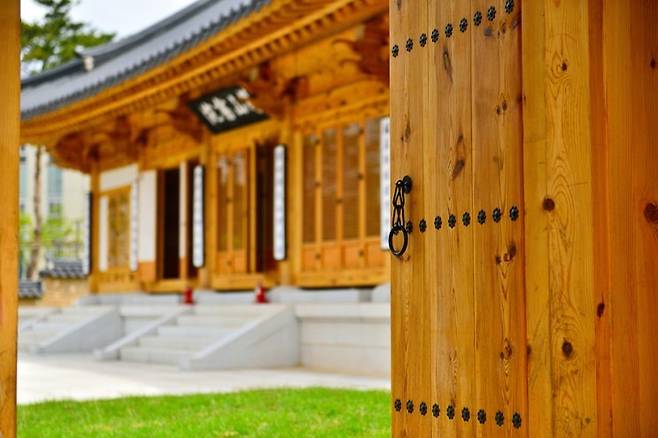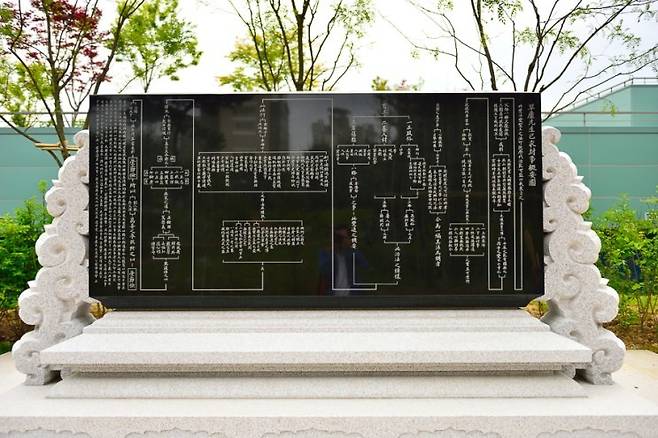[Scholars and their spaces] 'If you are not progressing, you are regressing'
전체 맥락을 이해하기 위해서는 본문 보기를 권장합니다.
The letter, considered to be the most notable appeal of its kind, was unprecedented at the time. More than 20,000 characters long, it contains a complete development plan for national reform proposed by Yi Yu-tae (1607-1684), a prominent scholar of the Giho school of Neo-Confucianism in the middle Joseon period. Upon reading the letter, King Hyojong shed tears and said, "All the policies presented in this appeal need to be implemented." This remains recorded in the "Seungjeongwon Ilgi," or the "Diaries of the Royal Secretariat."
His best writing, "Gihaebongsa," on the monument, shows his progressive and reformist thoughts, "If you are not progressing, you are regressing."
이 글자크기로 변경됩니다.
(예시) 가장 빠른 뉴스가 있고 다양한 정보, 쌍방향 소통이 숨쉬는 다음뉴스를 만나보세요. 다음뉴스는 국내외 주요이슈와 실시간 속보, 문화생활 및 다양한 분야의 뉴스를 입체적으로 전달하고 있습니다.

A monument to a scholar that stands in the center of Sejong city, South Korea’s administrative capital, is inscribed with a long letter to King Hyojong.
The letter, considered to be the most notable appeal of its kind, was unprecedented at the time. More than 20,000 characters long, it contains a complete development plan for national reform proposed by Yi Yu-tae (1607-1684), a prominent scholar of the Giho school of Neo-Confucianism in the middle Joseon period. Upon reading the letter, King Hyojong shed tears and said, “All the policies presented in this appeal need to be implemented.” This remains recorded in the “Seungjeongwon Ilgi,” or the “Diaries of the Royal Secretariat.”
“The king does not ask their subjects about governing policies. Subjects are not enthusiastic about their duties for the people. Schools do not make efforts to raise scholars. The government does not implement effective policies,” the letter reads.
The first half of the appeal realistically analyzes the situation and identifies the social ills plaguing the Joseon era. Specific action plans for reform are presented in the latter part of the appeal as follows. “Officials whose work requires professional expertise need to be ensured of the continuity of their positions without frequent changes, while incompetent officials need to be laid off.”

After the Second Manchu Invasion (1636), the royal government in Joseon became obsessed with factions and theories. In addition, both the public morality and official discipline were corrupt. It was under such circumstances that Yi tried to stabilize the livelihood of the people through royal statesmanship. In particular, it is notable that he called for reducing the dynasty’s harsh class discrimination and embracing a merit-based society. His policy gave shape to Yulgok’s plans for social reforms and put it into practice. Moreover, it caused a huge stir among Joseon’s Neo-Confucian scholars and provided justification for King Hyojong’s plan to conquer China’s Qing Dynasty, although the plan was never realized due to his sudden death. Yi’s reform plans, ranging from education, finance, wealth and the military to rural issues, led to protracted discussion in the royal court over their adoption and thus energized a social reform drive.
Although he returned home and focused on studying, living in seclusion, Choryeo Yi Yu-tae was a reformist thinker who kept pointing out the social ills of the time and warned people not to turn a blind eye. He always asserted that everyone needed to take precautions against national crises through practical approach to matters.
Choreyo History Park, built near the Sejong Government Complex in the center of Sejong in 2015, honors the scholar’s life. It is also houses the restored Galsanseowon, a Confucian academy originally built in 1694, and where Yi’s grave lies.
His best writing, “Gihaebongsa,” on the monument, shows his progressive and reformist thoughts, “If you are not progressing, you are regressing.”
By Park Jeong-eon (histopia78@gmail.com)
Park Jeong-eon is a senior researcher at Chungnam Institute of History and Culture. -- Ed.
By Korea Herald(khnews@heraldcorp.com)
Copyright © 코리아헤럴드. 무단전재 및 재배포 금지.